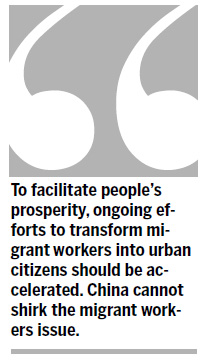Op-Ed Contributors
Prioritize people's prosperity
By Chi Fulin (China Daily)
Updated: 2011-03-08 08:02
 |
Large Medium Small |

More needs to be done to narrow the income gap, reform the tax system, and offer migrant workers welfare in cities
The top strategy established by the Fifth Plenary Session of the 17th Communist Party of China (CPC) Central Committee, held in mid-October 2010, to promote the country's scientific development and transformation of its economic development mode, is of an overall and strategic significance to the drafting of the 12th Five-Year Plan (2011-2015) for national economic and social development.
The transformation of China's economic development mode over the next five years is meant to realize the transformation of the country's development strategy from focusing on expanding its economic size to increasing people's incomes by adopting an equitable, scientific and sustainable approach. The key to achieving such a much-needed policy target lies in the adoption of reforms and development that prioritize people's prosperity.
Prosperity of a country and its people are extremely important. The long-established government-led growth model in China, however, has obviously focused on increasing the State coffers. Such a model means the country has made some remarkable achievements - it has expanded its economic aggregate and alleviated poverty - however, the rapid increase in the country's revenues and expansion of State capital during the 11th Five-Year Plan (2006-2010) period have made prominent the issues arising from a development strategy obsessed with increasing the size of the national economy.
The past years also show that a development model that prioritizes increasing State revenue causes the growth of its social consumption capability to lag behind that of national productivity, widening the gap between urban and rural areas and between the rich and the poor, and worsening social contradictions and risks.
Policies and measures that put more priority on promoting people's prosperity over the next five years will create good expectations for national economic development. They will help the country cultivate a domestic economic growth force. At the same time, they will help narrow the disparity in income distribution, allow people to share the fruits of the country's fast economic growth, and promote an equitable society.
To this end, the country should first try to achieve some major breakthroughs in its reform of the income distribution system. Some binding indicators should be set in the country's income distribution reform program due to be announced in the 12th Five-Year Plan. For example, a compulsory regulation should be worked out to ensure that the annual growth of the real incomes among urban and rural residents should be no less than 8 percent and the one for laborers' remuneration should be no lower than 10 percent. Some effective measures should also be adopted to alleviate and narrow the widening income gap. Currently, China's nominal income gap between urban and rural areas is 3.3:1. The gap is expected to be less than 3:1 by the end of the 12th Five-Year Plan period. To attain this, the country should work out a comprehensive program to reform its income distribution and its fiscal and taxation systems as soon as possible.
To facilitate people's prosperity, ongoing efforts to transform migrant workers into urban citizens should be accelerated. China cannot shirk the migrant workers issue in its efforts to advance either urbanization or urban-rural integration. The long-controversial issue has already become an important source of the widening gap between urban and rural areas and between the rich and the poor.
Over the past years, experimental moves have been made by some local governments to change migrant workers' status in a bid to integrate them into the urban community. Over the next five years, more policies should be adopted to facilitate this process. For example, specific measures to accelerate the transfer of rural land-use rights, promote a balanced public services network between urban and rural areas, and expand the construction of government-subsidized low-price or low-rental houses in urban areas for immigrant rural people.
The country's current fiscal and taxation system should also be reformed as soon as possible. The current separate tax systems for the central and local governments, adopted in 1994, have contributed much to the expansion of the country's economic aggregate, but they have failed to play their role in regulating the country's income distribution disparity. Therefore, a new round of fiscal and tax system reforms should be launched in the early years of the 12th Five-Year Plan period to promote people's prosperity. The country's revenues should be reasonably distributed among central and local governments for the sake of building a balanced public services network and making the fiscal strength of local governments commensurate to their administrative power.
China is entering a new development stage and its endeavor to transform its development mode desperately needs a simultaneous transformation of government functions. There can be little progress if no major breakthroughs are achieved in government transformation. Now that a market economy is established in China, the government should try to change its focus from economic affairs to public service.
The author is a member of the National Committee of the Chinese People's Political Consultative Conference and director of the Hainan-based China Institute for Reform and Development.
| 分享按钮 |